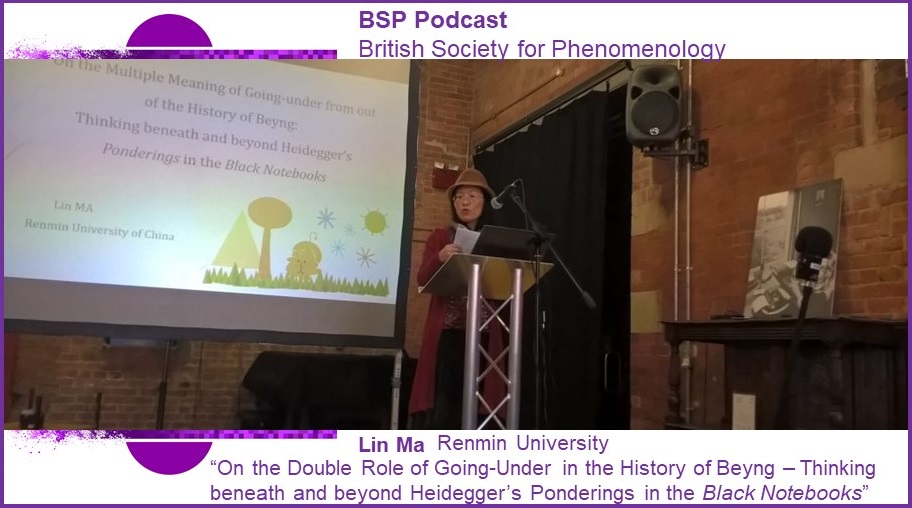Our podcast continues with another episode taken from a panel presentation at the JBSP’s 50th Anniversary Conference in summer 2019.
Season 4 episode 75: 10 June 2020
We continue season four of the British Society for Phenomenology Podcast with a paper from Lin Ma (Renmin University). This recording comes from the JBSP 50th Anniversary Conference: On the History of Being – After the Black Notebooks (2019) which was held in celebration of fifty years of the Journal of the British Society for Phenomenology.
Lin Ma: ‘On the Double Role of Going-Under in the History of Beyng – Thinking beneath and beyond Heidegger’s Ponderings in the Black Notebooks’
You can listen to this episode on the BSP’s Podbean site, and you can also find it on iTunes and all good podcasting apps by searching ‘BSP Podcast’.
ABSTRACT: In one of his Ponderings, Heidegger remarks, “the courage for philosophy is the knowledge of the necessary going-under (Untergang) of Da-sein.” Although the ponderings on going-under remain rather cryptic and fragmentary, one can discern a thematization of going-under throughout Heidegger’s six non-public meditations on the history of Beyng from 1936-1942. In the Contributions [1936-1938], going-under primarily bespeaks of the proper disposition or attunement the human being should have in order to be appropriated by Beyng, instead of remaining content with beings. The going-under is also the most intimate proximity to the refusal in which the appropriating event (Ereignis) bestows itself on the human being. In his Ponderings, Heidegger also speaks of the going-under as “the transition into the other inception.” This is the second role of the going-under for, or rather, from out of the history of Beyng. This aspect receives lengthy treatments in Heidegger’s other non-public writings composed after the Contributions. In Mindfulness [1938/1939], Heidegger points out that phusis in its essence entails going-under, which is not the end but rather is the “rounding of the beginning.” It is in On the Inception [1941] that Heidegger fully articulates the Beyng-historical significance of going-under. Here going under is “identified” with Heidegger’s most fundamental Beyng-historical notions, such as the appropriating event and inception. My paper is devoted to an examination of the multiple senses of going-under, in particular its double role in the history of Beyng.

Journal of the British Society for Phenomenology: Special Issue – Heidegger and the Black Notebooks (Volume 51, Issue 2, 2020). Other papers presented at the JBSP 50th Anniversary Conference have been reworked and published as essays in this special edition.
The JBSP 50th Anniversary Conference: On the History of Being – After the Black Notebooks (2019) celebrated 50 years of the journal. The British Society for Phenomenology held a three-day conference at the International Anthony Burgess Foundation, Manchester, UK from 31 May to 2 June, 2019. The aim of the event was to examine the contribution of Heidegger’s Schwarze Hefte (Black Notebooks) to an understanding of the question of the history of being.
The British Society for Phenomenology is a not-for-profit organisation set up with the intention of promoting research and awareness in the field of Phenomenology and other cognate arms of philosophical thought. Currently, the society accomplishes these aims through its journal, events, and podcast. Why not find out more, join the society, and subscribe to our journal the JBSP?

